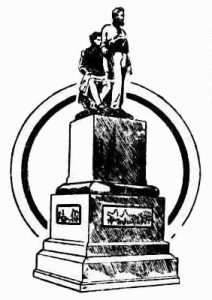[Editor: This article about the Burke and Wills expedition was published in the Newcastle Morning Herald and Miners’ Advocate (Newcastle, NSW), 16 February 1910.]
Burke and Wills.

In 1857 the Royal Society in Victoria appointed a committee to inquire into and report upon the subject of interior exploration; in 1858 some one donated £1000 anonymously on condition that £2000 more was subscribed within a twelve month. The money was raised and the Victorian Parliament supplemented it with a vote of £6000, this making £9000 in all.
In that way the expenditure was organised, with Mr. R. O’Hara Burke as leader, Mr. G. J. Landells as second, Mr. W. J. Wills as surveyor, Mr. T. Beckler as medical officer, Mr. Becker as artist and naturalist, Mr. C. D. Ferguson as assistant, and nine associates. With 25 camels, 23 horses, waggons, and stores, the expedition left Melbourne on 20th August, 1860, Burke’s instructions directing him to make Cooper’s Creek his base, to form a depot there, and to explore the country lying between it and the Gulf of Carpentaria.
The story of the expedition has been so often told as to make the repetition unnecessary. From Menindie, Burke and Wills and six men went forward, and later one of the latter was sent back to bring the rest up.
Weary of waiting, the leader detached a number of his party to stay and meet them, and then with Wills and two others, Gray and King, pushed on across the continent. The four reached the tropics on 7th January, 1861, and stood upon the banks of the Flinders on 18th February. On 21st of that month they started back, but their provisions ran out. On 16th April Gray died, and four days later Burke, Wills and King reached the Cooper’s Creek depot. The survivors of the rest of the party had by an extraordinary piece of ill-luck left there that very day.
Burke and his two companions then struck out to reach South Australia via Mount Hopeless. Failing, Wills struggled back to the depot, and left his journal there and then rejoined the others. He died a little later, and Burke soon followed him.
We now turn to the relief parties which were sent from Melbourne. One was led by Mr. Howitt, son of William and Mary Howitt, and this gained the Barcoo in September, 1861. On the 15th of that month the party’s attention was attracted by the shouting of a large body of natives, who pointed down a creek, where several other blacks were grouped. Mr. Welch went along and observed what he took to be a white man, who at once fell on his knees in an attitude of prayer. “Who are you?” asked Welch, and the reply was, “I am King, the last man of the exploring expedition.”
The sketch shows the Burke and Wills’ monument, the base of which has panel illustrations of their disastrous journey.
Source:
Newcastle Morning Herald and Miners’ Advocate (Newcastle, NSW), 16 February 1910, p. 4
Also published in:
The Lithgow Mercury (Lithgow, NSW), 18 February 1910, p. 7
Saturday’s Journal (Adelaide, SA), 19 February 1910, p. 5 [the Saturday edition of The Evening Journal]
The Glen Innes Examiner (Glen Innes, NSW), 25 February 1910, p. 5
Editor’s notes:
Barcoo = the Barcoo River (Queensland)
gained = reached, arrived at, got to
twelve month = a year (a period of twelve months) (also spelt: twelvemonth, twelve-month)
voted = allocated money or finances by a decision or a vote of parliament, a government, or another organisation
waggon = an archaic spelling of “wagon”
[Editor: Changed “rejoined the others,” to “rejoined the others.”.]
[Editor: The original text has been separated into paragraphs.]
Leave a Reply